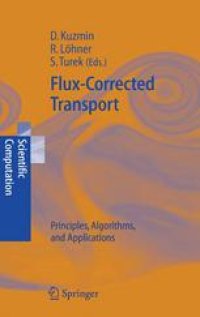
Ebook: Flux-Corrected Transport: Principles, Algorithms, and Applications
- Tags: Numerical and Computational Methods, Computational Science and Engineering, Mechanics Fluids Thermodynamics, Fluids, Numerical and Computational Methods in Engineering, Engineering Fluid Dynamics
- Series: Scientific Computation
- Year: 2005
- Publisher: Springer Berlin Heidelberg
- Language: English
- pdf
Addressing students and researchers as well as CFD practitioners, this book describes the state of the art in the development of high-resolution schemes based on the Flux-Corrected Transport (FCT) paradigm. Intended for readers who have a solid background in Computational Fluid Dynamics, the book begins with historical notes by J.P. Boris and D.L. Book. Review articles that follow describe recent advances in the design of FCT algorithms as well as various algorithmic aspects. The topics addressed in the book and its main highlights include: the derivation and analysis of classical FCT schemes with special emphasis on the underlying physical and mathematical constraints; flux limiting for hyperbolic systems; generalization of FCT to implicit time-stepping and finite element discretizations on unstructured meshes and its role as a subgrid scale model for Monotonically Integrated Large Eddy Simulation (MILES) of turbulent flows. The proposed enhancements of the FCT methodology also comprise the prelimiting and 'failsafe' adjustment of antidiffusive fluxes, the use of characteristic variables, and iterative flux correction. The cause and cure of detrimental clipping/terracing effects are discussed. Many numerical examples are presented for academic test problems and large-scale applications alike.
Addressing students and researchers as well as CFD practitioners, this book describes the state of the art in the development of high-resolution schemes based on the Flux-Corrected Transport (FCT) paradigm. Intended for readers who have a solid background in Computational Fluid Dynamics, the book begins with historical notes by J.P. Boris and D.L. Book. Review articles that follow describe recent advances in the design of FCT algorithms as well as various algorithmic aspects. The topics addressed in the book and its main highlights include: the derivation and analysis of classical FCT schemes with special emphasis on the underlying physical and mathematical constraints; flux limiting for hyperbolic systems; generalization of FCT to implicit time-stepping and finite element discretizations on unstructured meshes and its role as a subgrid scale model for Monotonically Integrated Large Eddy Simulation (MILES) of turbulent flows. The proposed enhancements of the FCT methodology also comprise the prelimiting and 'failsafe' adjustment of antidiffusive fluxes, the use of characteristic variables, and iterative flux correction. The cause and cure of detrimental clipping/terracing effects are discussed. Many numerical examples are presented for academic test problems and large-scale applications alike.
Content:
Front Matter....Pages I-4
The Conception, Gestation, Birth, and Infancy of FCT....Pages 5-27
The Design of Flux-Corrected Transport (FCT) Algorithms For Structured Grids....Pages 29-78
On Monotonically Integrated Large Eddy Simulation of Turbulent Flows Based on FCT Algorithms....Pages 79-104
Large Scale Urban Simulations with FCT....Pages 105-130
30 Years of FCT: Status and Directions....Pages 131-154
Algebraic Flux Correction I. Scalar Conservation Laws....Pages 155-206
Algebraic Flux Correction II. Compressible Euler Equations....Pages 207-250
Algebraic Flux Correction III. Incompressible Flow Problems....Pages 251-296
Back Matter....Pages 297-301
Addressing students and researchers as well as CFD practitioners, this book describes the state of the art in the development of high-resolution schemes based on the Flux-Corrected Transport (FCT) paradigm. Intended for readers who have a solid background in Computational Fluid Dynamics, the book begins with historical notes by J.P. Boris and D.L. Book. Review articles that follow describe recent advances in the design of FCT algorithms as well as various algorithmic aspects. The topics addressed in the book and its main highlights include: the derivation and analysis of classical FCT schemes with special emphasis on the underlying physical and mathematical constraints; flux limiting for hyperbolic systems; generalization of FCT to implicit time-stepping and finite element discretizations on unstructured meshes and its role as a subgrid scale model for Monotonically Integrated Large Eddy Simulation (MILES) of turbulent flows. The proposed enhancements of the FCT methodology also comprise the prelimiting and 'failsafe' adjustment of antidiffusive fluxes, the use of characteristic variables, and iterative flux correction. The cause and cure of detrimental clipping/terracing effects are discussed. Many numerical examples are presented for academic test problems and large-scale applications alike.
Content:
Front Matter....Pages I-4
The Conception, Gestation, Birth, and Infancy of FCT....Pages 5-27
The Design of Flux-Corrected Transport (FCT) Algorithms For Structured Grids....Pages 29-78
On Monotonically Integrated Large Eddy Simulation of Turbulent Flows Based on FCT Algorithms....Pages 79-104
Large Scale Urban Simulations with FCT....Pages 105-130
30 Years of FCT: Status and Directions....Pages 131-154
Algebraic Flux Correction I. Scalar Conservation Laws....Pages 155-206
Algebraic Flux Correction II. Compressible Euler Equations....Pages 207-250
Algebraic Flux Correction III. Incompressible Flow Problems....Pages 251-296
Back Matter....Pages 297-301
....